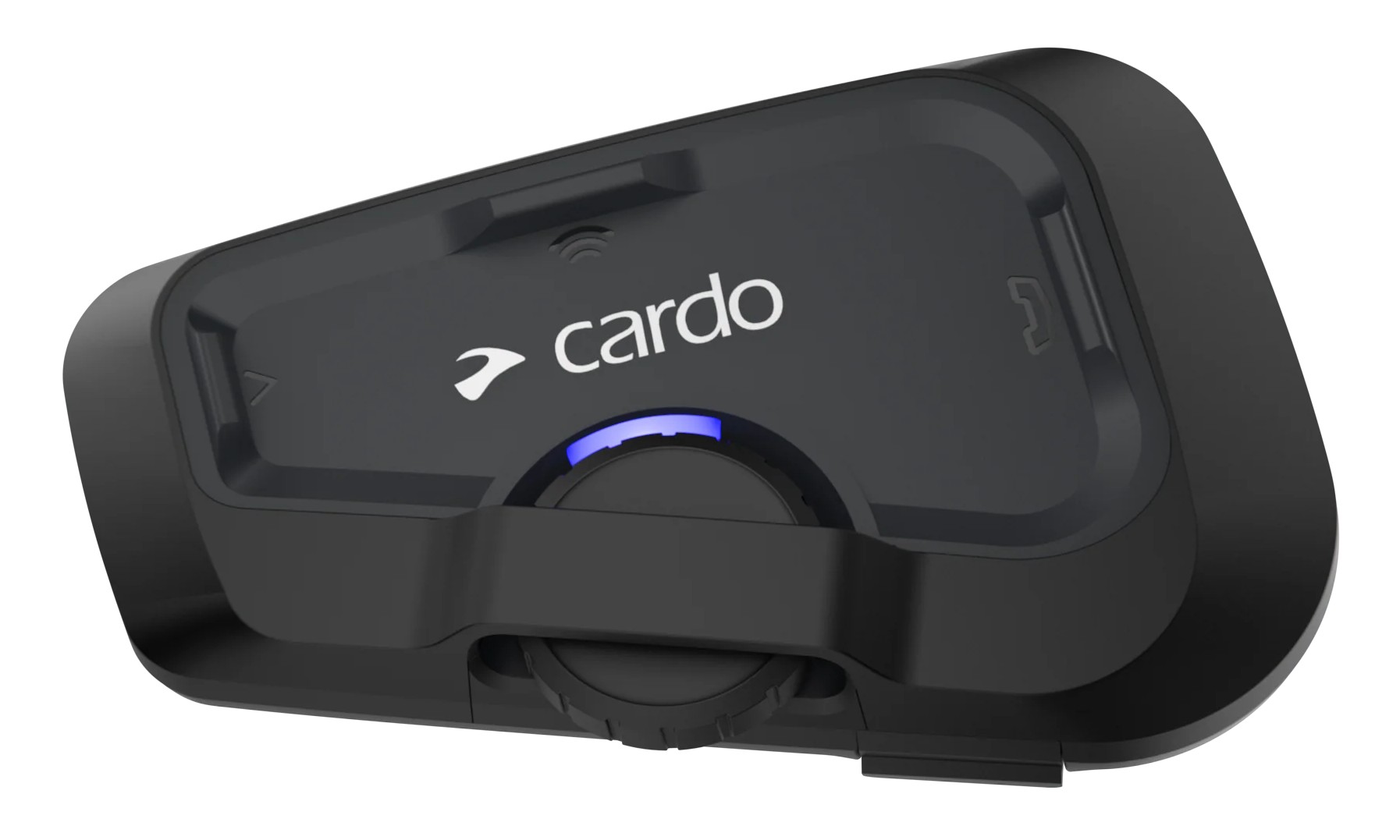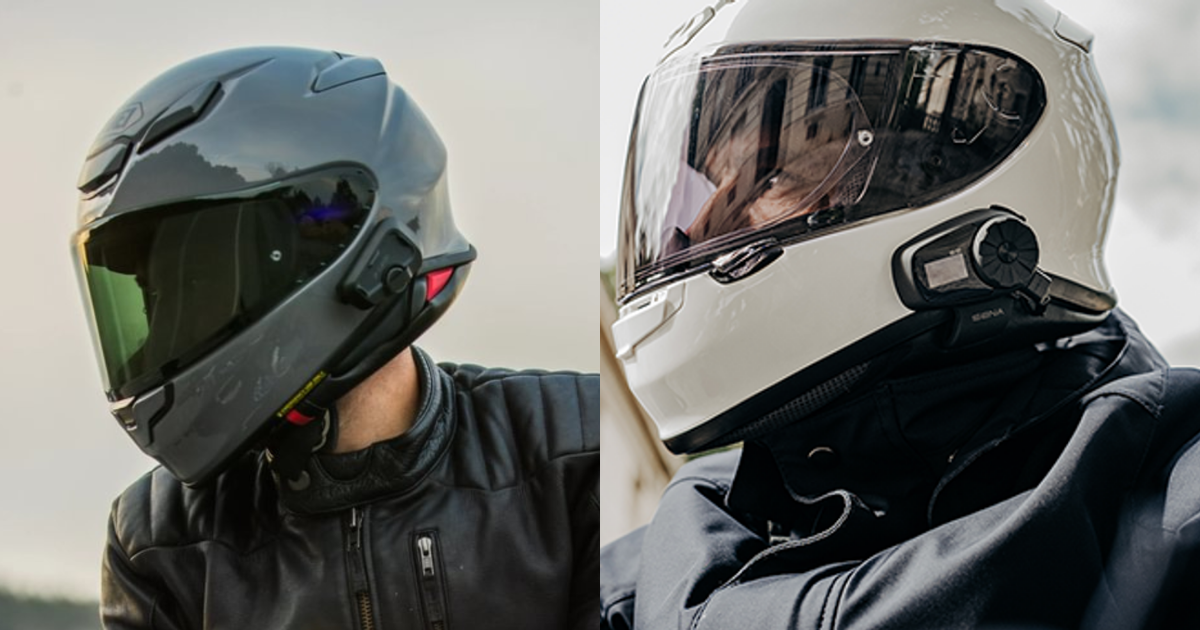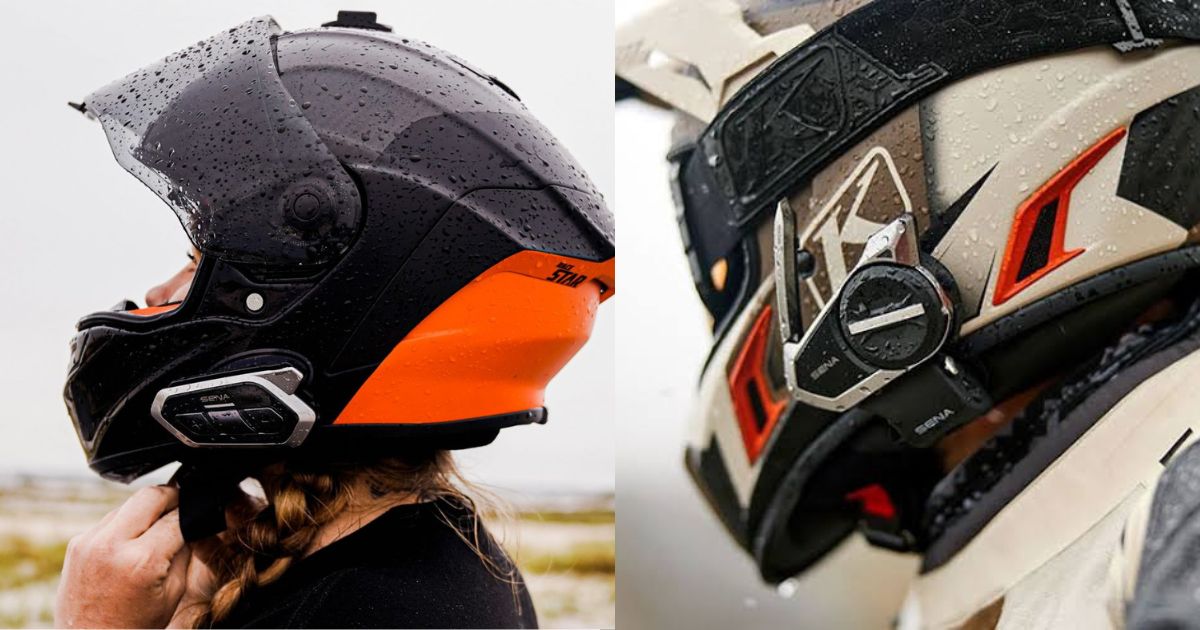
Cardo Freecom 4X vs Packtalk Edge: Which Matches Your Style?
left for contents
When I first started researching motorcycle communication systems, I made the mistake most riders make — I assumed all Cardo units were basically the same, just with different price tags. After all, they’re from the same brand, right? How different could they really be?
That assumption cost me months of frustration with a system that didn’t match how I actually ride. The truth is, even within Cardo’s own lineup, the differences between models can make or break your riding experience. The Freecom 4x and Packtalk Edge aren’t just different price points — they represent fundamentally different philosophies about motorcycle communication.
|
|
|
|
$359.96 | $260.96 |
- 1.6 km (~1 mi) unit‑to‑unit range (works through obstacles, we've tested)
- Up to 8 km (5 mi) group range
- 13 hr battery life
- Magnetic Air‑Mount snaps securely
- Fiddly to remove with gloves
- Not ideal if your crew all use Sena
- Waterproof
- JBL 40mm speakers
- Voice control & Live Intercom
- No mesh support
- Limited to 4 riders
I’ve spent extensive time testing both systems across everything from solo commutes through city traffic to multi-day group tours through challenging terrain. What I discovered is that choosing between these two isn’t about budget alone — it’s about understanding exactly how you ride and what you actually need from a communication system.
If you’re trying to decide between Cardo’s most popular mainstream option (Freecom 4x) and their advanced mesh-enabled system (Packtalk Edge), this comprehensive comparison will save you from making an expensive mistake.
At a Glance: The Core Differences
Cardo Freecom 4x: A solid, no-nonsense Bluetooth communication system designed for small groups and riders who want reliable basics without complexity. It connects up to 4 riders with a range of up to 1.2km/0.75 mi and focuses on delivering proven Bluetooth reliability at an accessible price point.
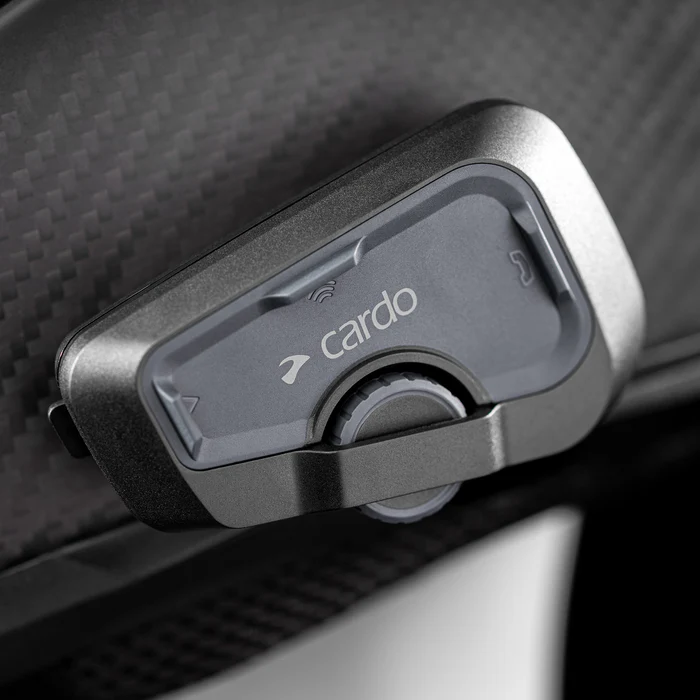
Cardo Packtalk Edge: Cardo’s advanced mesh-networking powerhouse that transforms group riding dynamics. The Edge connects up to 15 riders with a maximum unit-to-unit range of a mile and a maximum group range of five miles, representing a significant leap in capability and complexity.
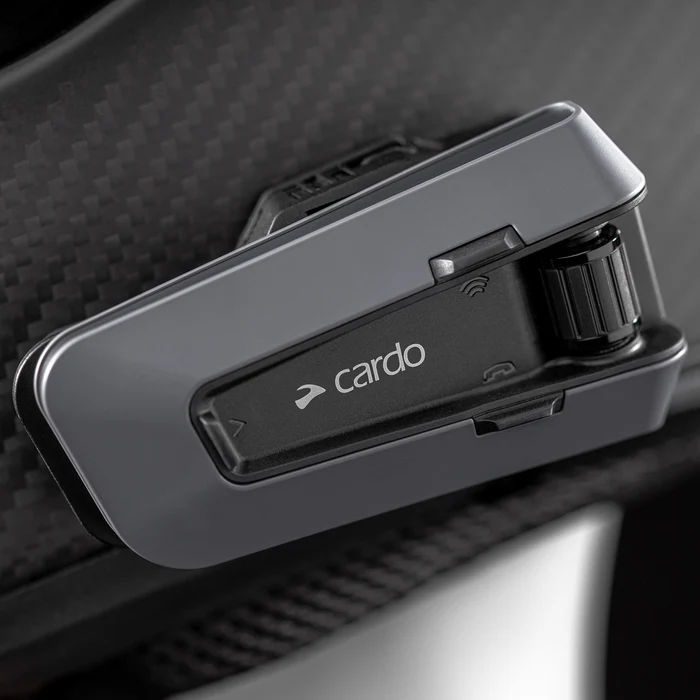
The price difference reflects this philosophy — while both systems deliver excellent value in their respective categories, the Edge’s advanced mesh technology and premium features command a higher price point that’s justified by its expanded capabilities.
Check out our detailed review of the Cardo Packtalk Edge with mesh and magnetic mount
Communication Technology: The Fundamental Divide
This is where these systems diverge most dramatically, and it affects every aspect of how they perform in different riding scenarios.
Freecom 4x: Refined Bluetooth Excellence
The Freecom 4x features Bluetooth 5.2 technology with wideband sound and self-healing connection, supporting up to 4 riders with a maximum range of 1.2 kilometers (0.75 miles) in optimal conditions. In riding with varied terrain, obstacles, and interference, expect effective range closer to 800-900 meters.
This traditional Bluetooth approach offers several key advantages:
Simplicity and Reliability: The system behavior is predictable and straightforward. Pairing follows standard Bluetooth protocols, making it intuitive for riders familiar with other Bluetooth devices. The connection logic is simple — each rider connects directly to others within range.
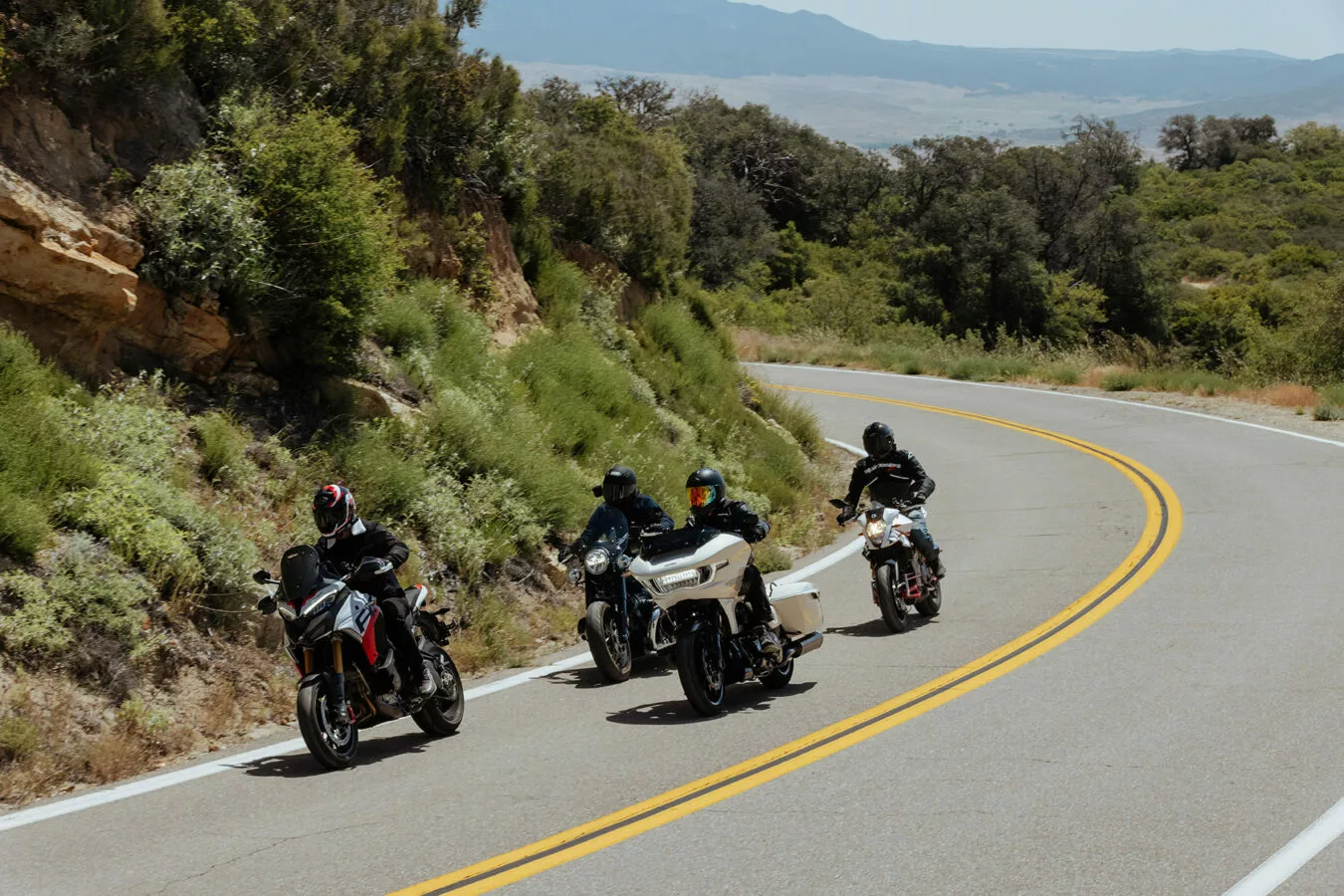
Universal Compatibility: The system seamlessly connects with any other major brand, making it ideal for mixed groups where riders use different communication systems. This cross-brand compatibility ensures you’re never excluded from group communication due to equipment differences.
Battery Efficiency: Bluetooth-only operation maximizes the impressive 13-hour battery life. Without the power demands of mesh networking, the system can operate for full-day rides without charging concerns.
Proven Technology: Fewer variables mean fewer potential failure points. The mature Bluetooth technology has been refined over years of development, resulting in stable, predictable performance.
However, traditional Bluetooth also presents limitations that become apparent in certain riding scenarios:
Fixed Group Limitations: Once you reach the 4-rider maximum, adding another rider requires someone to disconnect. This becomes problematic for growing riding groups or when meeting additional riders on tours.
Range Constraints: Riders who fall significantly behind, take alternate routes, or stop for extended periods lose communication entirely. There’s no relay capability to extend effective range through intermediate riders.
Manual Reconnection: When riders move out of range and return, manual reconnection is often required. The system doesn’t automatically rebuild broken connections as seamlessly as mesh alternatives.
Packtalk Edge: Revolutionary Mesh Networking
The Edge introduces second-generation Dynamic Mesh Communication (DMC), representing a complete paradigm shift in motorcycle communication technology. This isn’t merely an incremental upgrade — it’s a fundamentally different approach to group connectivity.
The Packtalk Edge comes with a max rider-to-rider range of one mile, while the max group range is five miles. This extended group range is achieved through mesh networking, where riders at opposite ends of a large group can communicate even when beyond direct range of each other.
Self-Healing Network Architecture: The mesh network automatically manages connections, routing communication through available riders to maintain group connectivity. If the direct path between two riders is broken, the system finds alternative routes through other group members.
Dynamic Range Extension: Unlike traditional systems where range is fixed by the weakest link, mesh networking extends effective communication distance by using intermediate riders as relay points. A 15-rider group can maintain communication across distances that would be impossible with traditional Bluetooth.
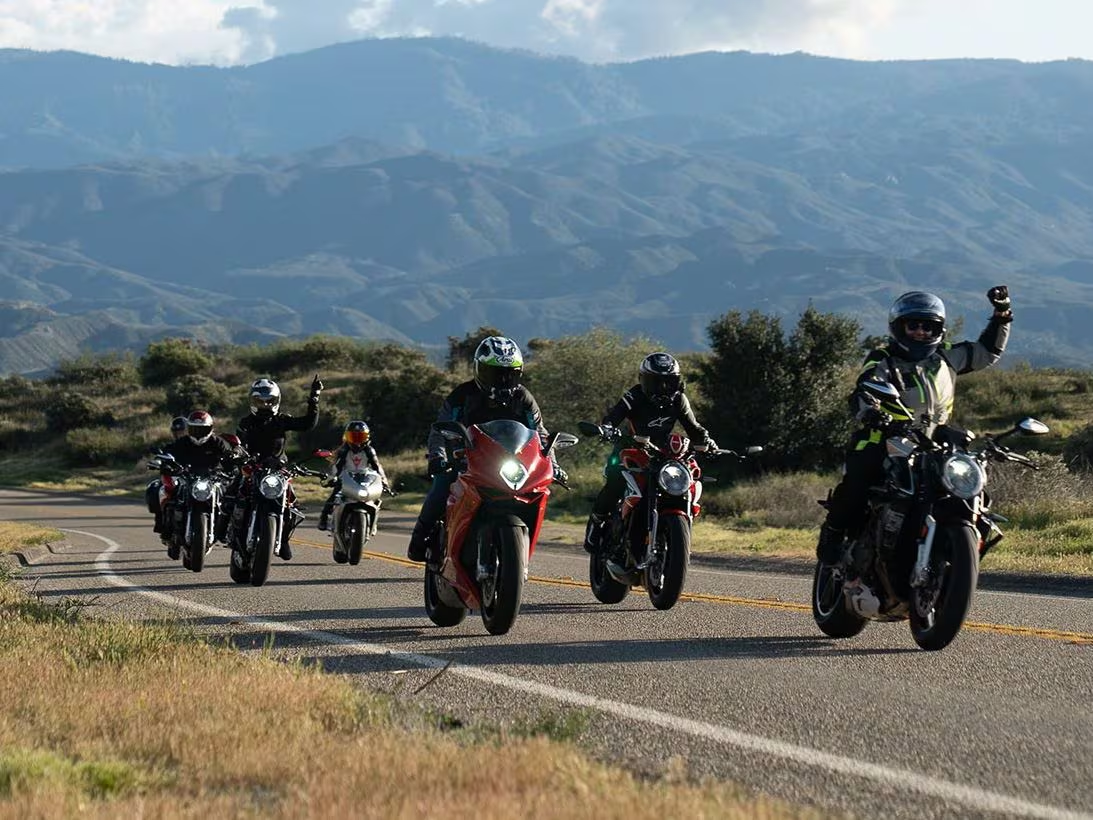
Automatic Reconnection: Riders who temporarily lose contact — whether due to distance, obstacles, or brief stops — automatically rejoin the network when they return to range. No manual intervention required.
Scalability: Supporting up to 15 riders represents a significant capability increase over the 4-rider Bluetooth limitation. This scalability makes the Edge suitable for large group tours, riding clubs, and complex riding scenarios.
Performance Testing: During testing with a 12-rider mountain tour, the group spread across 4+ kilometers of twisty canyon roads while maintaining clear communication from lead to sweep rider. Traditional Bluetooth systems would have required multiple relay points and constant manual management.
Audio Excellence: JBL Partnership Implementation
Both systems benefit from Cardo’s partnership with JBL, but their implementation reflects different priorities and use cases.
Freecom 4x Audio System
The Freecom 4x is equipped with 40 mm HD JBL speakers with specially tuned music processor and three distinctive audio profiles. The system delivers excellent voice communication clarity and adequate music reproduction, with particular strength in mid-range frequencies that cut through wind noise effectively.
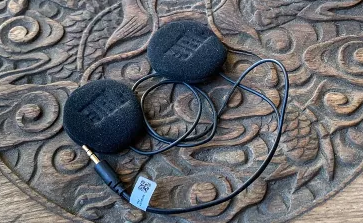
The three audio profiles allow optimization for different scenarios:
- Balanced Profile: Optimized for mixed use with good voice and music performance
- Voice-Optimized: Enhanced clarity for intercom communication in noisy conditions
- Music-Focused: Improved bass response and dynamic range for entertainment
Audio processing focuses on simplicity and effectiveness. The system handles standard audio routing — music, GPS prompts, phone calls, and intercom — with clear prioritization and smooth transitions between sources.
Check out our Freecom 4X review—JBL sound, waterproof build, Bluetooth clarity
Packtalk Edge Audio Enhancement
The Edge uses the same 40mm JBL speakers but with enhanced audio processing optimized for mesh communication complexity. The system has 40mm speakers and includes more sophisticated audio management capabilities.
The enhanced processing becomes apparent when managing multiple simultaneous audio streams — a common scenario in mesh mode where GPS navigation, music, phone connectivity, and multi-rider intercom communication all compete for attention. The Edge handles these complex audio scenarios more elegantly:
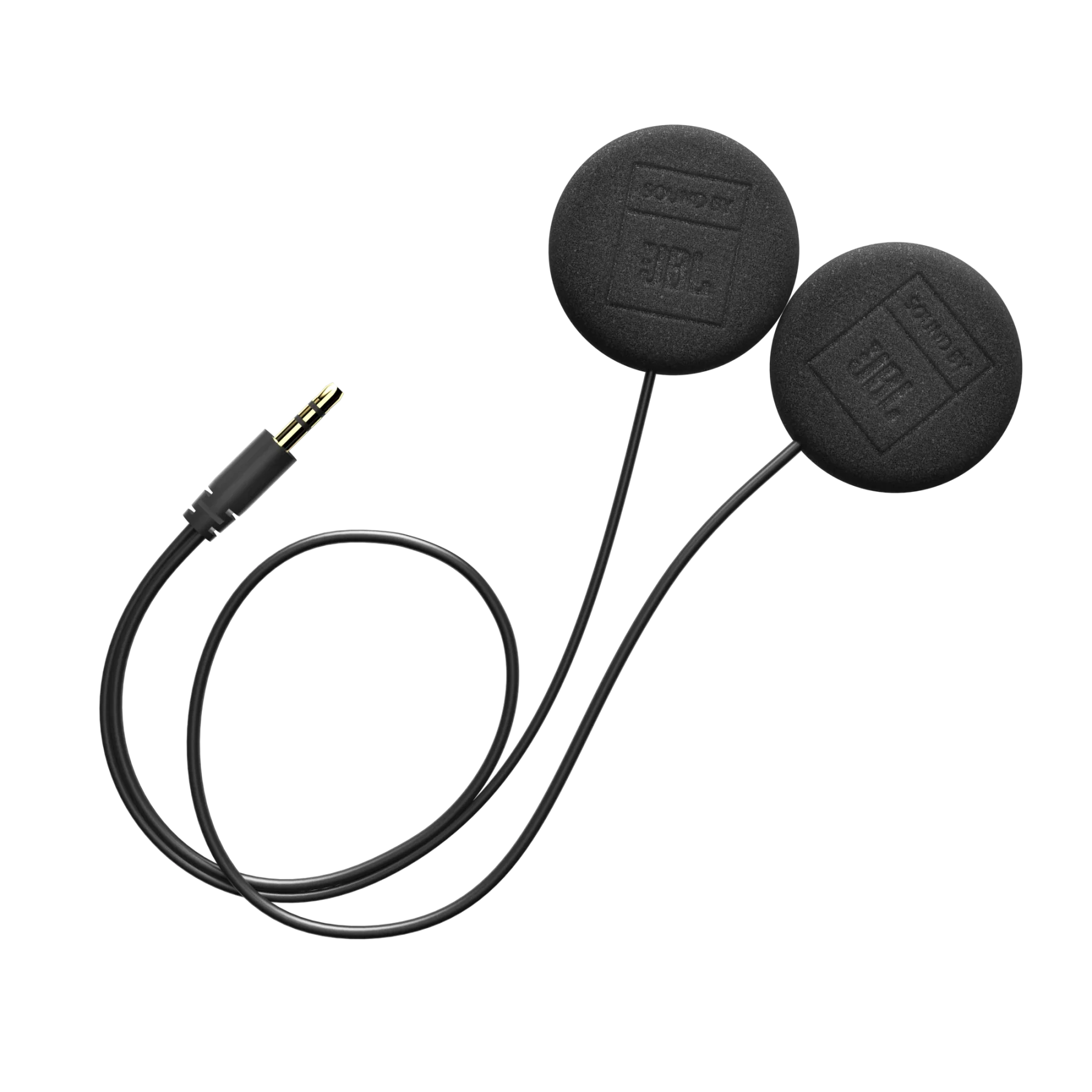
Intelligent Audio Mixing: Music fades appropriately for GPS prompts, which pause correctly for intercom communication, while maintaining phone call readiness. The transitions feel natural rather than jarring.
Mesh-Optimized Processing: Audio compression and noise reduction are specifically tuned for mesh networking scenarios where audio quality must be maintained across multiple relay points.
Advanced EQ Management: The system adapts audio characteristics based on connection type and environmental conditions, optimizing clarity for current riding conditions.
Voice Control Evolution: From Basic to Natural
Voice control represents one of the most significant practical differences between these systems, affecting daily usability more than specifications might suggest.
Freecom 4x Voice Commands
The Freecom 4x includes basic voice command functionality with standard recognition accuracy. The system is operated by Natural Voice, though this represents the entry-level implementation of Cardo’s voice technology.
The system responds to common commands for volume adjustment, music control, and basic intercom functions. However, recognition accuracy varies significantly with environmental conditions. Clear pronunciation and relatively quiet conditions are necessary for reliable operation.
In practical testing, the Freecom’s voice control works adequately in ideal conditions but struggles with:
- High wind noise at highway speeds
- Significant engine noise from loud motorcycles
- Open-face or poorly sealed helmet configurations
- Complex command sequences
Packtalk Edge Natural Voice System
The Edge introduces Cardo’s advanced “Natural Voice” system with significantly improved recognition capabilities. The “Hey Cardo” activation system works reliably even in challenging acoustic environments.
Key improvements include:
Enhanced Recognition Accuracy: The system functions reliably with significant wind noise, engine sound, and poor acoustic conditions that defeat simpler systems.
Learning Capability: Recognition accuracy improves with use as the system learns individual speech patterns and accent characteristics.
Expanded Command Set: More comprehensive voice control covering advanced mesh functions, detailed audio management, and system configuration options.
Environmental Adaptation: Processing algorithms adjust for current acoustic conditions, improving recognition in challenging environments.
During highway testing at 75+ mph with an open-face helmet, the Edge’s voice control remained functional while the Freecom’s system became unreliable. This represents a significant practical advantage for riders who depend on hands-free operation.
Build Quality and Design Innovation
Mounting Revolution: Magnetic vs. Traditional
Freecom 4x Mounting: Uses Cardo’s proven clip/cradle mounting system. This mechanical approach provides secure attachment through positive engagement mechanisms. While reliable, it requires deliberate manipulation and can be challenging with thick gloves or in cold conditions.
Packtalk Edge Magnetic Air Mount: The PACKTALK EDGE features a magnetic Air Mount, whereas PACKTALK NEO has a clickable mounting. This represents a complete reimagining of communication system integration.
The magnetic system offers several practical advantages:
- Instant Attachment: Perfect alignment and secure connection with one motion
- Gloved Operation: No fine motor control required for attachment/removal
- Multiple Helmet Compatibility: Easy transfer between different helmets
- Security Benefits: Quick removal for storage or security
- Maintenance Access: Easy access for charging or firmware updates
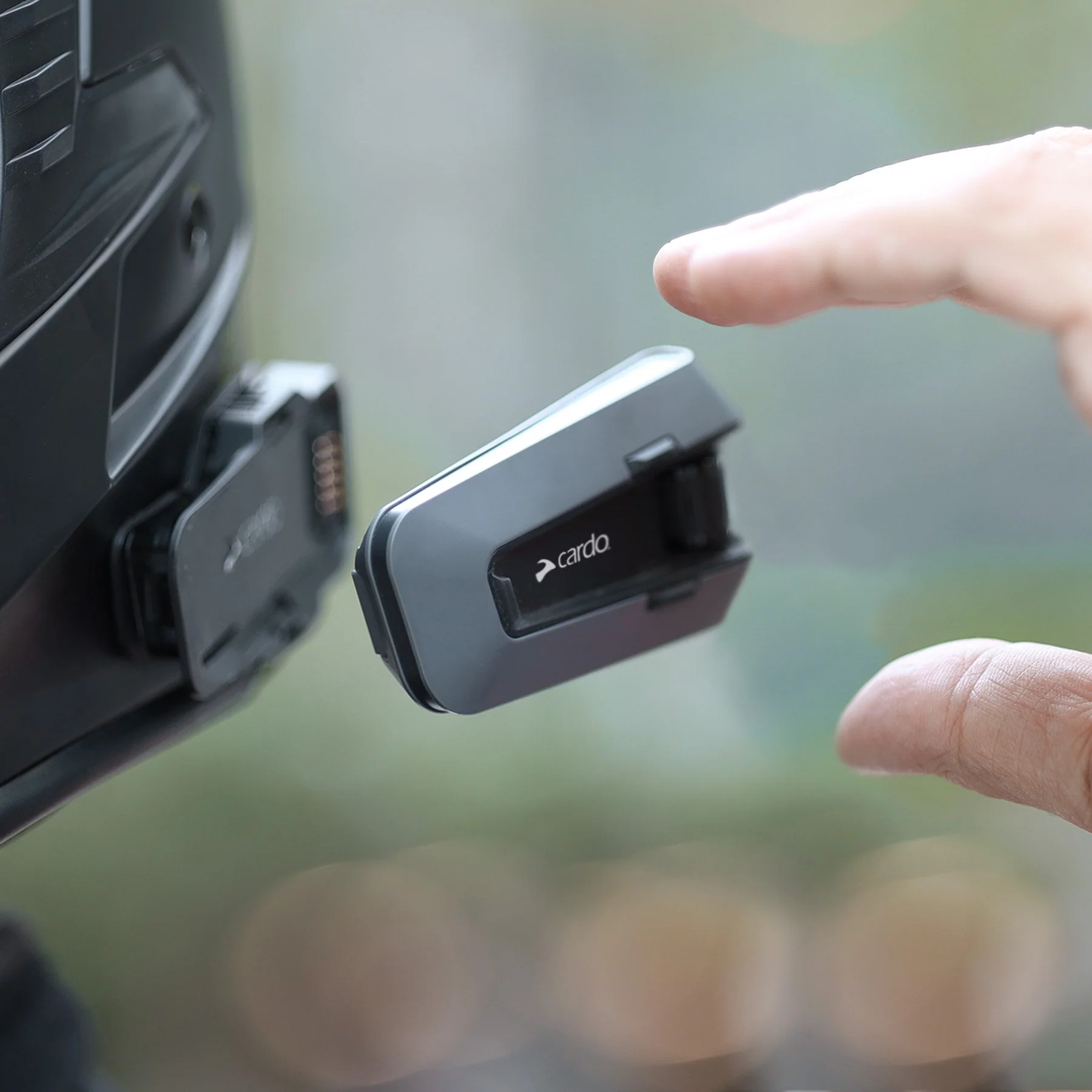
The magnetic mount isn’t just convenience — it represents a fundamental improvement in user experience that becomes more valuable with regular use.
Advanced Features and Future-Proofing
Software Updates and Connectivity
Both systems support over-the-air updates, but implementation differs:
Freecom 4x: Features Over-The-Air Software Updates with no cables needed, ever. Updates provide bug fixes and minor feature enhancements, maintaining system currency without computer connections.
Packtalk Edge: More comprehensive OTA update capability supporting significant feature additions and system enhancements. The mesh networking foundation allows for more substantial software improvements over time.
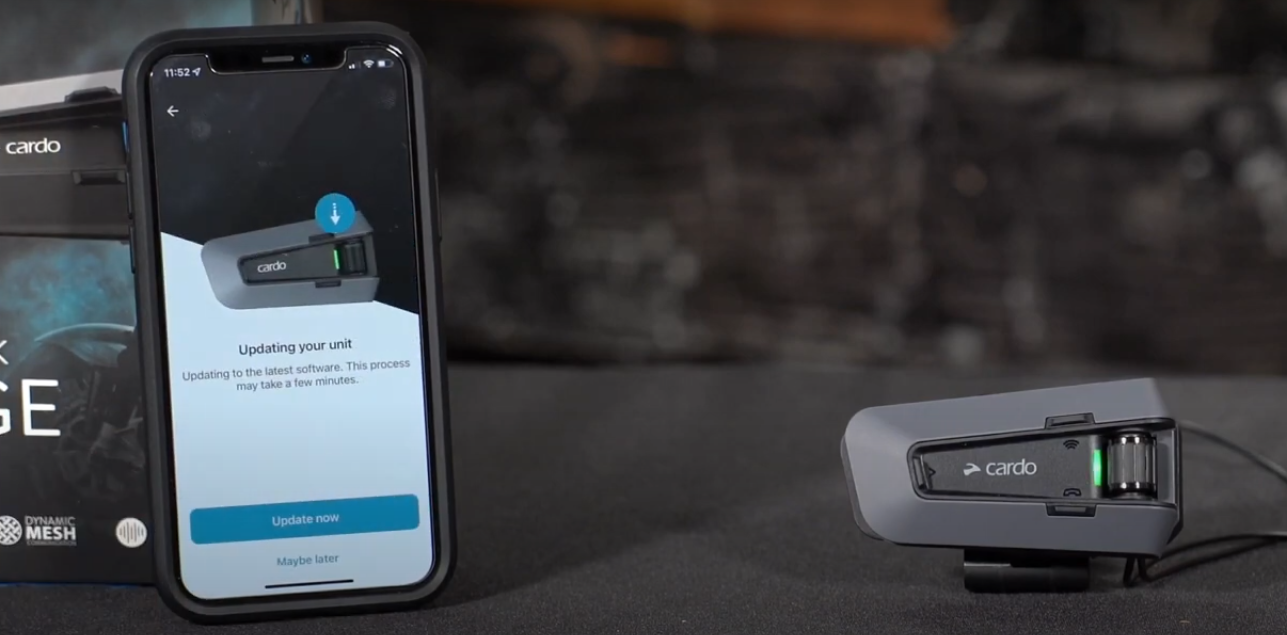
Performance Impact: The Edge has received several major updates since launch, adding features like improved mesh algorithms, enhanced voice recognition, and expanded device compatibility. The Freecom receives updates primarily focused on stability and compatibility.
Performance: Community Feedback and Professional Testing
After analyzing extensive feedback from motorcycle communities and professional reviews, clear performance patterns emerge across different riding scenarios.
Urban and Commuting Performance
Both systems excel in urban environments, but for different reasons:
Freecom 4x: Excels in predictable commuting scenarios with consistent rider positions. Battery life advantage becomes significant for daily users who may not charge regularly.
Packtalk Edge: Superior performance in complex urban scenarios with varying group sizes, route changes, and mixed riding conditions. Voice control reliability proves valuable in stop-and-go traffic.
Touring and Adventure Riding
The differences become more pronounced in demanding touring scenarios:
Mesh Advantage: Multiple riders emphasized that mesh connectivity transforms group touring dynamics. The ability to maintain communication across extended distances and through challenging terrain represents a fundamental capability difference.
Reliability Patterns: Users consistently report more predictable performance from the Edge in challenging conditions, though both systems prove reliable within their designed parameters.
Small Groups (2-4 riders): Both systems perform excellently with choice determined primarily by feature preferences and budget considerations.
Medium Groups (5-10 riders): The Edge’s mesh networking provides clear advantages in group management and communication reliability.
Large Groups (10+ riders): Only the Edge supports these group sizes effectively, making it the clear choice for riding clubs and large tour groups.
Technical Specifications: Complete Comparison
| Feature | Freecom 4x | Packtalk Edge |
| Release Year | 2021 | 2022 |
| Communication Technology | Bluetooth 5.2 only | 2nd Gen DMC + Bluetooth 5.2 |
| Maximum Riders | 4 riders | 15 riders |
| Rider-to-Rider Range | 1.2 km (0.75 mi) | 1.6 km (1 mi) |
| Maximum Group Range | 1.2 km | 8 km (5 mi) |
| Audio System | 40mm JBL HD speakers | 40mm JBL speakers |
| Audio Profiles | 3 profiles | Enhanced processing |
| Battery Life | 13 hours talk time | 13 hours + charging while riding |
| Charging | USB-C, fast charging | USB-C + ride-while-charging |
| Mounting System | Clip/cradle mount | Magnetic Air Mount |
| Waterproofing | Waterproof | Enhanced waterproof |
| Voice Control | Basic Natural Voice | Advanced “Hey Cardo” |
| Software Updates | Over-the-air | Enhanced OTA capability |
| Warranty | 2 years | 3 years |
| Cross-Brand Compatibility | Universal Intercom | Universal Intercom |
Making the Right Choice: Detailed Buying Guidance
Choose Cardo Freecom 4x If You:
Ride primarily solo or with 1-3 consistent partners: The 4-rider limit isn’t restrictive when your group size is predictable and stable.
Stay within close proximity during rides: The 1.2km range is adequate when groups maintain formation and don’t spread out significantly.
Value simplicity and reliability: Proven Bluetooth technology offers predictable performance without mesh networking complexity.
Budget is a primary consideration: The Freecom delivers excellent value, providing premium JBL audio and reliable communication at an accessible price point.
Prefer straightforward operation: Less complex interface and operation appeal to riders who want communication systems that “just work” without extensive configuration.
Ride in mixed-brand groups: Universal Intercom compatibility ensures seamless integration with other communication systems.
The Freecom 4x represents the refined evolution of traditional motorcycle communication — reliable, efficient, and perfectly adequate for mainstream riding needs.
Choose Cardo Packtalk Edge If You:
Participate in group rides with 5-15 riders regularly: The expanded capacity and mesh networking make large group communication practical and reliable.
Engage in touring or adventure riding: Extended range and self-healing connectivity prove invaluable when groups spread out over varying terrain and distances.
Value cutting-edge technology and features: Advanced voice control, magnetic mounting, and sophisticated audio processing justify the premium.
Need maximum reliability in challenging conditions: Mesh networking provides redundancy and automatic recovery that traditional systems can’t match.
Want future-proof technology: The mesh networking foundation supports ongoing feature development and system enhancement.
Appreciate convenience features: Magnetic mounting, charge-while-riding capability, and enhanced voice control improve daily usability.
Plan to integrate with advanced systems: Superior compatibility with GPS, smartphones, and emerging motorcycle technologies.
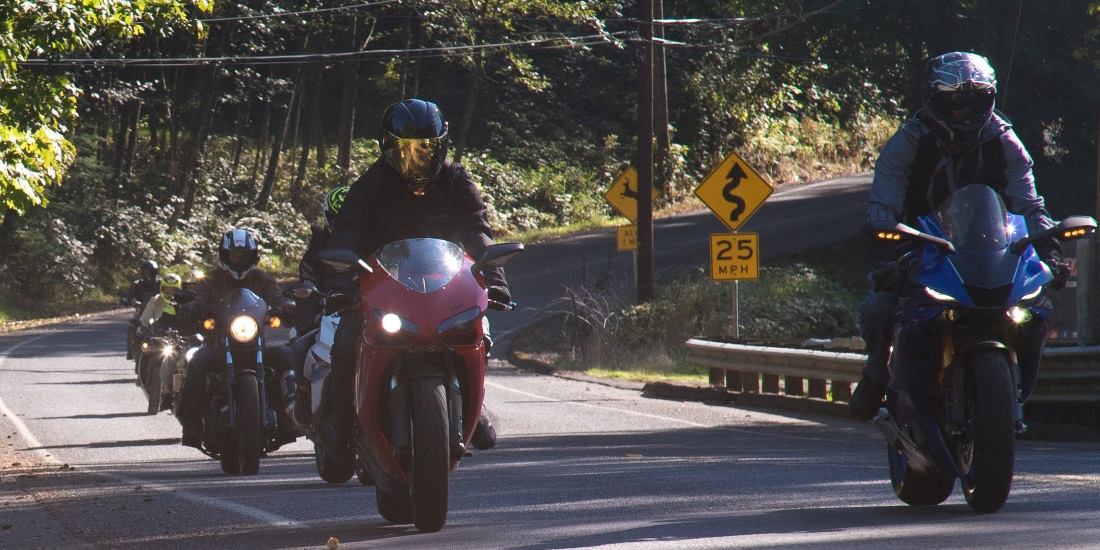
The Packtalk Edge is designed for serious riders who demand their communication system handle complex scenarios reliably and evolve with their needs.
Love a helmet that only fits a specific comms unit?
HJC, Shoei, Schuberth, Nexx and even Harley all try to force you in to custom-fit comms units that may not fit how you ride. So Tubs Jackson created an adapter to get a factory fit for any comms unit on these otherwise amazing helmets.
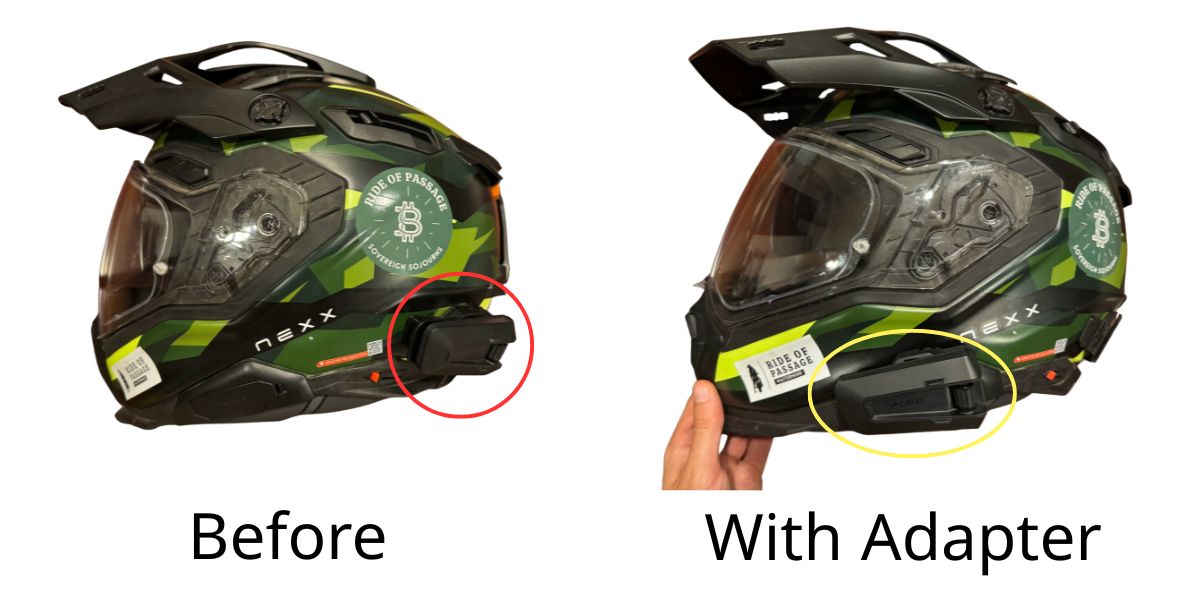
Tubs Jackson is a weird name, I know, but I have their adapter in my Nexx X.WED3 helmet and it’s rock solid. Much nicer than reaching way back to where I had the sticky mount before. I wish I’d thought of this idea.
Tip: Get FREE SHIPPING just by buying here or using code BETTERONTHEROAD at checkout.
The Bottom Line: Technology Meets Riding Reality
After extensive testing and analysis, the choice between these systems comes down to honest assessment of your actual riding patterns and group dynamics.
The Freecom 4x delivers everything most riders need with proven technology, excellent audio quality, and reliable performance. It excels as a daily communication tool that focuses on core functionality without unnecessary complexity. For riders whose needs align with its capabilities, it represents outstanding value.
The Packtalk Edge represents a significant technological advancement that transforms group riding dynamics. The mesh networking capability alone justifies the premium for riders who regularly encounter its limitations with traditional systems. Combined with advanced features like magnetic mounting and enhanced voice control, it offers a premium experience that grows more valuable with use.
|
|
|
|
$359.96 | $260.96 |
- 1.6 km (~1 mi) unit‑to‑unit range (works through obstacles, we've tested)
- Up to 8 km (5 mi) group range
- 13 hr battery life
- Magnetic Air‑Mount snaps securely
- Fiddly to remove with gloves
- Not ideal if your crew all use Sena
- Waterproof
- JBL 40mm speakers
- Voice control & Live Intercom
- No mesh support
- Limited to 4 riders
Final Recommendation: Consider your riding over the next 2-3 years, not just current needs. If you anticipate larger groups, more challenging rides, or desire cutting-edge features, the Edge’s advanced capabilities will prove invaluable. If your riding needs are stable and well-served by traditional Bluetooth, the Freecom 4x offers excellent value with proven reliability.
Both are exceptional systems within their intended use cases. The key is matching system capabilities to your actual riding patterns rather than aspirational scenarios that may never materialize.
Related
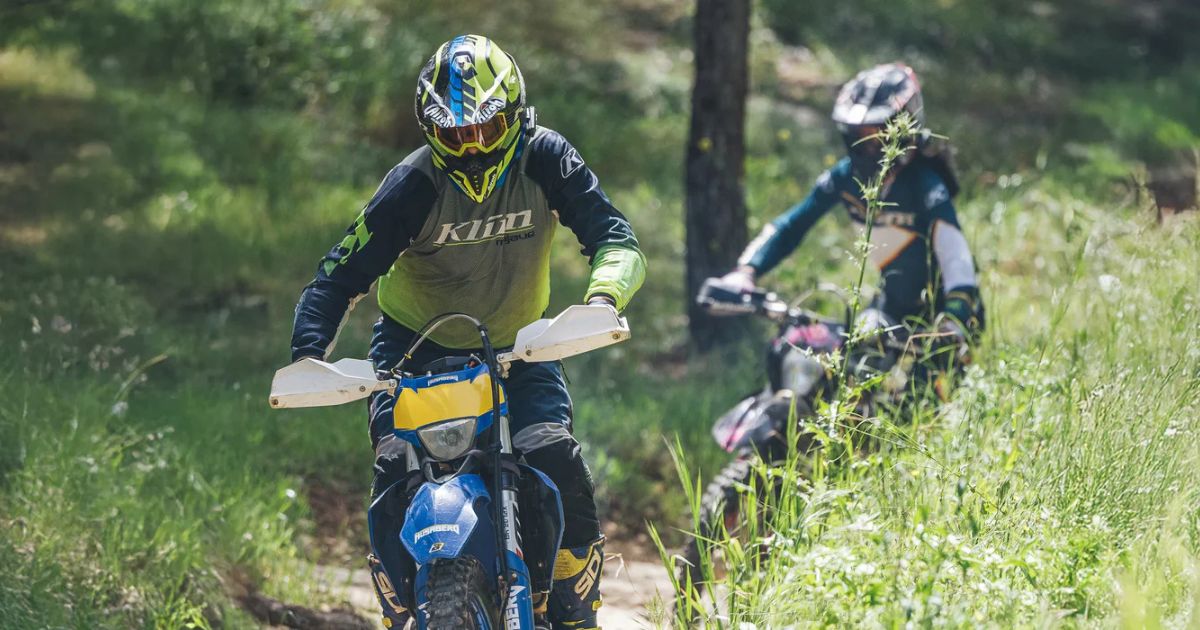
Best Cardo Communicators for Motorcycle Riders
Find the best Cardo communicator for your rides—compare mesh, Bluetooth, sound, and features to match your budget, group size, and style.


